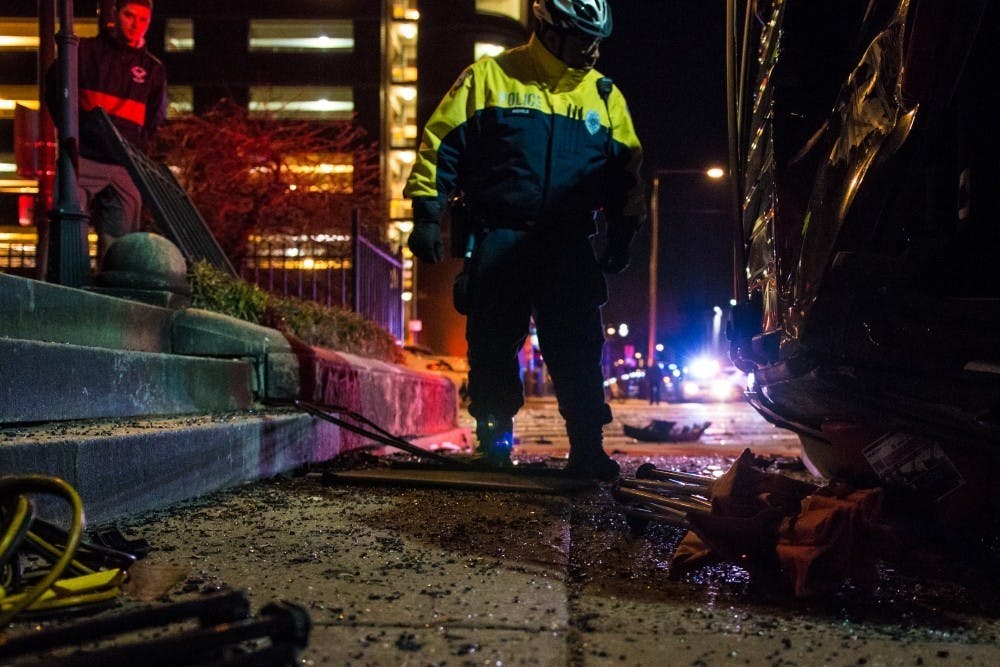Penn Police officers have been working for six months without a contract and the president of their union said morale is at an “all-time low” as negotiations between the Division of Public Safety and the Penn Police Association have ground to a halt.
The contract between the PPA and the University expired on July 31, 2017 and has yet to be renewed because representatives from the union and DPS have not been able to agree on the terms of the contract.
Over the past couple of months, union members have voiced their grievances about being required to work overtime on a fairly consistent basis, such as during the "Bomb Cyclone" in early January 2018 when officers had to assist at the Hospital of the University of Pennsylvania, PPA President Eric Rohrback said.
Although officers who are tasked with mandated overtime are paid time-and-a-half, Rohrback added that the impromptu hours are particularly hard for officers with family commitments and issues at home. Even though they are given extra compensation, they still are required to work.
Despite there being no formal contract that permits the assigning of overtime, Maureen Rush, the DPS vice president, said, “the collective bargaining agreement between us and the union solidifies the right to assign overtime. We need to assure that we serve the public need.”
Overtime notwithstanding, wages and pensions continue to be points of contention between the PPA and DPS.

Advertisement taken out by Penn Police in The Daily Pennsylvanian
The union submitted an advertisement to The Daily Pennsylvanian in early September 2017 to publicize their frustrations with the negotiations and call on the Penn community to advocate for their interests. The ad encouraged students to ask the University to "compensate their police department fairly."
RELATED:
With 120 officers, Penn has the largest private police force in Pennsylvania
After working for three months without a contract, Penn Police union head says 'morale is horrible'
Penn officers have a starting salary of less than $52,000 and a maximum annual salary of less than $65,000, according to data provided by the Penn Police. Both rates are lower than those for the Philadelphia Police Department and those of officers at other campuses such as Princeton University, Yale University, Stanford University, Rutgers University, the Massachusetts Institute of Technology, and Harvard University.
“They keep telling me that there is no more money for us, and that we can go three years without a contract,” Rohrback said. “I tell the members that, and they go, ‘OK.’ This is something that they are passionate about. They feel that they deserve this.”
Additionally, Rohrback said Rush told him that if Penn police officers were not happy with their current conditions, they could take their employment elsewhere.
When the DP reached out to DPS to confirm Rohrback's accounts of conversations with Rush, DPS neither confirmed nor denied that they took place, and instead provided a general statement.
“We are happy to discuss any issues regarding the contract at the next round of communications with the Penn Police Association. My command staff and I are proud of the great work being done by the dedicated officers of the Penn Police Department,” Rush wrote in the emailed response.
Even so, Rohrback said many officers who join the force from the Philadelphia or surrounding county departments partly do so because of Penn’s competitive health care benefits and tuition benefits for their college-aged children.
In November 2017, for the 10th consecutive year, DPS was ranked No. 1 in safety and security in the higher education sector in Security Magazine’s “Security 500” list.
DPS comprises 178 personnel, 117 of whom are sworn University of Pennsylvania Police Officers. Of those 117 police officers, 87 are members of the Penn Police Association — nearly three quarters of the force.
The remaining 30 non-unionized officers are primarily composed of higher ranking, or “A1,” officers such as lieutenants and captains whose terms of employment do not allow them to formally unionize.
Rohrback contends that some of these A1 officers have quietly voiced their support for the PPA’s efforts. According to Rohrback, however, they remain relatively uninvolved in union negotiations, out of fear of retribution from Rush and other senior DPS administrators.
In early October 2017, DPS gave the PPA a "final offer" for a 9-percent base-salary increase over three years, but members of the PPA rejected it with a vote of 59-to-4, Rohrback said.
The PPA’s labor attorney, Stephen J. Holroyd, a lawyer with the firm, Jennings Sigmond P.C., did not respond for comment.
Despite the ongoing negotiations, both Rush and Rohrback assure the surrounding community that internal disputes will not affect the standards of normal security operations.
“We want to solidify the collective bargaining agreement for everyone,” Rush said.



